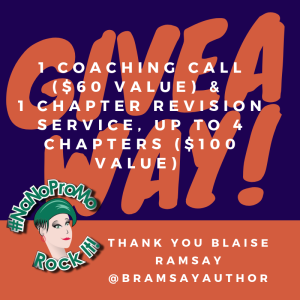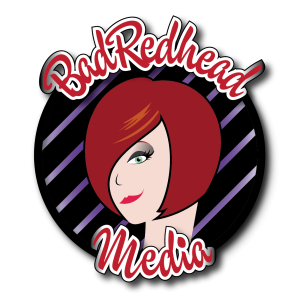Pitching: What You Need To Know Now by guest @bramsayauthor
Welcome to #NaNoProMo 2019!
Let’s talk about your pitch today.
The publishing world is a struggle. With agents receiving multiple submissions from multiple authors, it is easy for your manuscript to get lost in the author’s proverbial nightmare: the “slush pile.”
As a publishing company and as professional book reviewers who request a pitch, often times we see the author sending us things like reviews or rewards the author’s book has received. This is not what an agent, publisher or book reviewer wants or needs immediately when asking for a pitch.
Recently, FyreSyde Publishing has been working to open up submissions to help authors looking for representation. Though we do not require agents (yet), we do expect an elevator pitch prior to receiving a query letter.
For #NaNoProMo 2019, we are delighted to bring authors a better understanding of what a pitch is, how you can properly write an elevator pitch and provide some steps on how you can write an award-winning pitch that can land you an agent.
Let’s discuss.
What Is an Elevator Pitch? Is it Different Than a Regular Pitch?
The answer to this is a resounding yes. Think of it this way – you are on an elevator with a stranger you notice likes to read a book in the same genre you write in. You have only seconds to tell this potential reader what your book is about. This is what is known as the Elevator Pitch. It should be done in no more than a few words max.
What does it do?
It gives the potential agent or publisher a glimpse into what they can expect from your title before they even ask you to query.
Some good examples of this can be found via this article at Jerichowriters. Below is the elevator pitch for one of our author’s books:
Blessing of Luna: Non-human male MC meets a beautiful wolf shifter, falls in love and gets involved in the darker part of her world.
You can tell who the MC is, mentions he forms a relationship but is in for more than he expected which is the story at its most basic. It’s also something you can tell someone in that short elevator ride. You might not be asked to pitch this way too often but it’s something to keep in your bag of tricks. We have been asked many times to pitch our titles this way at conventions.
If that’s an Elevator Pitch, What’s a Regular Pitch?
A pitch is actually just a bit longer and more in-depth version of the elevator pitch. It is the very heart of your story and in some cases, can be used when writing your book’s description. You want to really sell your book to the agent or publisher and avoid the dreaded “slush pile.”
For your reading convenience, we have broken down the essentials an author needs to include in order to construct a killer pitch. At the very end, we will include some helpful articles you can refer to when writing your very own pitch.
- What is your story about?
- What can the reader expect from your book?
- Tell the potential reader why they should want to read your book? What makes it different?
- Make sure it’s free of grammatical errors, misspelled words and unneeded details.
- At the very end, really sell yourself. What awards have you won? Are you a bestseller? (Don’t worry if you have none of these, you don’t have to add them)
-
What Is Your Story About?
An agent, book blogger or publisher needs to know what your story is about. Award-winning author Tomi Adeyemi, author of Blood and Bone offers some amazing insight on how to do this by breaking down the synopsis of the popular Lion King. This is not the time to ramble; make it short and sweet.
FyreSyde usually prefers at least 150-200 words of summary. It might be less if you choose to go with another publisher. Be sure to check with them as we all have our own preferences.
-
What Can We Expect From Your Book?
As authors and book bloggers ourselves, FyreSyde wants to know what we can look forward to when reading your pitch. In a world of fiction, tell us when the story is set, paint a picture of your world for us, let us know the exciting plot we can look forward to. Knowing this often really sells your book because it gives a short tease of the plot.
-
Why Should We Read It? What Makes it Different?
Publishers, bloggers, and agents see many requests for manuscripts, reviews, and queries. At FyreSyde, we need to know what makes your paranormal romance book different from the ones we’ve reviewed (and we’ve reviewed many). If your book is going to leave us with a certain lingering emotion, we want to know. If it has a delicious plot twist or a cliff hanger, tell us. Something we’ve found that helps sell books is when someone tells us titles we can relate to.
For example, one of our team members is an avid Harry Dresden fan. If your book is like Jim Butcher’s Dresden Files, you might write: “For fans of Jim Butcher’s Harry Dresden.” A tip: try to get to know a little bit about who you’re pitching to. Research what titles they publish or their upcoming titles. It could give you a glimpse as to how to formulate your pitch.
-
Check for Spelling and Grammar (This is Important)!
Nothing and I mean nothing impacts the first impression for an agent or publisher more than poor grammar, spelling, missed words, and typos. I am sure you’ve heard “You never get a second chance at a first impression.” Well, this is one of those times.
If your pitch is full of grammar or spelling errors, there is a big chance it could get tossed out without further consideration. FyreSyde is very selective and if we received an unedited pitch, odds are we won’t even consider working with the author. This is a business for us as well and often it is our reputation on the line too.
Take great care. Read your pitch aloud, have a friend look at it or if you know an editor, have them look at it. You don’t want to be rejected because you didn’t make your pitch as strong as it could be.
-
Sell Yourself: Awards, Bestseller, Etc.
While we at FyreSyde don’t really consider awards as a basis for choosing who we work with (in some cases), other publishers and agents may want to see who they’re working with. If you have won some awards, received best-seller status or some other magnificent thing, go ahead and add it in.
You wrote your book, are holding it in your hand and won over your peers. Celebrate that! If you don’t have anything like this, it’s more than okay. Like I said, not all agents or publishers look at these things. Our review team doesn’t really consider awards as a factor in what we review. A tip: If a book blogger asks for a pitch, don’t rely on awards to get them to review your books. It’s most likely not what they’re asking for, but rather an actual pitch.
If you found this helpful be sure to look into these other articles when formatting your pitch. They may help you:
- How To Pitch A Literary Agent by Tomi Adeyemi
- 5 Steps to Writing a Killer Elevator Pitch
- How to Write an Elevator Pitch
Also, we would love to see your pitch at FyreSyde as we are accepting a few submissions.
Email us at fyresydepublishing@gmail.com with the subject line [ATTN:] Submission Inquiry – Title & Author Name.
rocket
THE GIVEAWAY
A coaching call ($60 value) and chapter revision service ($100 value) for up to four chapters. 
Want to win this giveaway? Simply leave a comment WHY below!
All comments must be left prior to midnight on Monday, May 6th, 2019 in order to be eligible to win. Winners for the week announced on Tuesday, May 7.
Good luck!
Blaise Ramsay
FyreSyde Publishing owner and founder, Blaise Ramsay, started out her creative career in the conceptual art and design industry. For fifteen years she spent her time crafting characters and world for others. Recently she shifted her attention to the world of literature where she writes mostly paranormal romance.
Her debut title, Blessing of Luna is the first of four books in the Wolfgods series. A portion of the proceeds of her book sales goes to help charities. When Blaise isn’t busy working with sexy wolf boys, she can be found reviewing books for fellow authors, working for a few tour companies, holding interviews and offering guest posts. A professional book blogger, mom, wife and full-blood Texan, Blaise loves nothing more than helping others, meeting new people and coaching folks in Scrivener.
If you would like to get in touch with Blaise, the best way to contact her is via email at bramsayauthor@gmail.com. She loves to hear from people and get questions from her readers.
For a more detailed plan on developing your book marketing, purchase Rachel’s new book,
The BadRedhead Media 30-Day Book Marketing Challenge now on Amazon!
Already a 5-Star Reader’s Favorite!
Have you signed up for my newsletter yet?




Interesting. The coaching call/chapter rewrite could be useful to help me get unstuck on my projects. I think I’m at the point of “don’t know what I don’t know” lol.
Greetings Raiscara,
Thank you for taking the time to comment. It can be a daunting task to begin revisions when we simply don’t know where to start and what questions to ask. I remember being in those points in many of the titles I worked on. I wish you the best of luck in the giveaway and sincerely hope the information helped you!
Wow. I thought I worked on my pitch before for my fiction novel, but it was more of a query letter. Now I understand the difference. A coaching call would be wonderful to talk about genre – mine is a”speculative fiction” – if that is a category at all. What happens when you take some current events and flip them? (I think I just had an idea…) An edit would tell me a lot, as I am on my fifth edit, tightening each time, and now I realize I need to possibly combine a bunch of chapters for better flow…but I need help…and obviously too many ellipses.
From one Book Blogger to another, Greetings! Although, to be honest, I have to admit I started writing reviews to garner name recognition while I worked on my manuscripts. My book reviews, as well as maintaining my social media sites have taken over my life as my scripts sit collecting dust. Nevertheless, I’ve met some terrific writers and believe my day will come.
Thank you for introducing us to the difference between an elevator pitch and a regular pitch. I bookmarked the pages you provided for referencing when my day does arrive. As an English major, I believe I have the other tips ingrained within my mind, namely checking for grammar and spelling. I firmly believe that anyone who intends to write a book should master their grammar and spelling first; this is especially the case for Indie Authors. I’ve declined to review a few books based on improper or incorrect grammar, lack of correct spelling, character dialect, and building, weak plots, et cetera. I get no pleasure out of writing a mediocre book review. I want all writers to be successful.
Thank you for being a part of the second year of #NaNoProMo.
Sincerely,
Donna
Thank you so much for this post! I love that it was clear and easy to understand and that you added some examples. I’ve been doing Twitter Pitch events this past year and that has really helped me craft short pitches.
Hi Sara! So glad the article helped you. Twitter is great practice for elevator pitches! You’re very welcome!
Blaise,
Thank you for a very helpful article on what’s needed for a successful pitch. I’ve dealt with pitching as a screenwriter, but my screenplays are all comedies. My upcoming novel is fictional but with roots in actual tragedy (the rape and murder of a fifteen year old girl I knew). I’m donating from the proceeds to organizations that help rape survivors and their families. In many ways, I feel that I’m starting from square one on pitching. I appreciate having your article to use as a guide.
Sincerely,
Dana Lemaster
No problem. I’m very glad it seems to be helping people. If you like you are welcome to have our team look over your pitch. I am delighted to hear you are doing such a noble thing. It feels like some authors are skittish to touch on such subjects. It sounds like a deep story I’d like to hear more about.
It is always a pleasure to participate in such an amazing event. Such perfect timing too as FyreSyde just opened our first round of submissions. Already, the information has been super helpful and informative. I can’t wait to see how this month goes! It’s always so exciting!
I’m a little confused – when you say you expect an elevator pitch prior to a query, does that mean the initial reach out to you should literally only have an elevator pitch in it? Or do you mean that’s the intro to a longer email/ letter?
An elevator pitch is handy to have when you meet an agent or publisher at a book event. It gives them insight into what they can expect from your book. A pitch itself is where you go into detail as to why a publisher or agent should look at your book. It is very similar to a query letter but much shorter. Think of a pitch as being the description of your book on Amazon. It isn’t elaborating on the details of your book but offering a bit about it and what we can expect from your book.
FyreSyde deals with elevator pitches at the live events we attend. It lets us know if we might want to request a query. We actually deal with querying when it comes to submissions and pitches when it comes to reviews and guest posts. Hope that clears things up for you.
I’ve never pitched a book, but I’ve tried something similar with potential readers. That is, I’ll mention that I’m an author and if they express interest then I hand them a business card. I’ve prepared a card for each of my books with a thumbnail of the cover, where it can be purchased, my web site, and the book’s blurb.
For an elevator pitch to a publisher or agent, would the business card idea be useful?
Brian,
As a publisher, I know I wouldn’t want to get a card to give me a pitch. It usually seems a bit unprofessional and can easily get lost with all the cards I get handed. However, as a publisher who goes to conventions, business cards and advertising cards are an amazing way to reach potential readers!
You’re tempting me to make the pitch when I probably wouldn’t otherwise. I’m going to give this serious consideration this weekend and (probably) take the plunge. Really useful post–I like the way you’ve made the distinctions in types of pitches and how-to steps to formulate your own.
McKenna,
I’m very glad the post helps you. As a publisher, we are always wanting to hear author pitches, especially since we do so many live shows. Having a pitch can help tell an agent or publisher you meet in person what they can expect from your book. Having one prepared can help you land sales in the weirdest places you might never think of. I definitely recommend having one ready!
I’m prepping for DFW Con and terrified about the pitch/consultation opportunity. I’ll be coming back to this post many times in the next month. Thank you! Readers are lost in the first chapters, getting unvarnished input is worth more than the suggested retail price would love to win the consult & revision.
Very glad it helped. I understand how daunting pitching can be. DFWCon huh? You aren’t too far away from us. We couldn’t make it this year unfortunately but we are aiming to go next year. I wish you the best in the giveaway!
So this article was really helpful.
It also made me feel a whole lot better about myself since I occasionally feel like I’m in a vacuum as an author. Or maybe an abyss…not sure.
Elevator pitches are something I am horrible at. I talk to people for a living, every day and I can talk about writing in general, pop culture, my kids, the shape of the damn clouds etc without missing a beat. Ask me about one of my books and go and on about it talking with my hands and a whole lot of inflection to the point I have bored the person senseless.
So thanks for the advice and course of action. It will help me practice.
Michael, I’m very glad the article helped you! At FyreSyde, we know what it feels like to feel lost in a vast sea of faces. It’s one reason we pride ourselves on walking with our authors from the very start of their journey. Elevator pitches can be extremely difficult but in the long run can land you sales in some of the most unthinkable places. Definitely spend some time making one and if you need any help, feel free to reach out to us at FyreSyde. We love to help in any way we can!